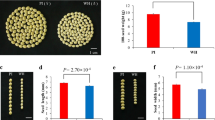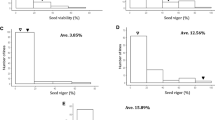Abstract
The seed hardness of vegetable soybean (VSB) is generally regarded as an important quality characteristic that contributes largely to its processing and mouthfeel. However, the genetic control of it is still a gray area. To identify the dynamic quantitative trait loci (QTLs) and detect the genetic relationship between seed hardness and growth period traits at the QTL level, conditional and unconditional QTL analyses were performed using a population of 184 recombinant inbred lines in 2015, 2016 and 2017. For seed hardness at stage 1 to stage 4 (W1–W4), 12 and 8 QTLs were identified by unconditional and conditional mapping, respectively. The comparative analyses between unconditional and conditional mapping uncovered three types of dynamic QTLs underlying seed hardness in the development of VSB. These results demonstrated that genes underlying seed hardness were actively expressed in the interval between stage 2 and stage 3, which was in parallel with the mass filling period in the development of soybean seeds. For seed hardness at R6 stage (W), 11 unconditional QTLs were detected. When W was conditioned on the number of days after sowing to R6 stage (DAS), the number of days after flowering to R6 stage (DAF) and flower time (FT), 11, 2, and 2 conditional QTLs were identified, respectively. Four types of unique QTLs distinguished the contributions of DAS, DAF and FT to the genetic effects of W. Of these, uqW.D1b-1 and uqW.A1-2 control W with independent of DAS or FT. Hence, they would be valuable for the selection softer seed lines, without the simultaneous depression of growth period traits even though there exist significant positive correlation between them. The loci identified by conditional and unconditional QTL analyses may be useful for the improvements of decreased seed hardness with the best balance of growth period through marker assisted selection (MAS).





Similar content being viewed by others
References
Arcade A, Labourdette A, Falque M et al (2004) BioMercator: integrating genetic maps and QTL towards discovery of candidate genes. Bioinformatics 20:2324–2326. https://doi.org/10.1093/bioinformatics/bth230
Atchley WR (1984) Ontogeny, timing of development, and genetic variance-covariances structure. Am Nat 123:519–540. https://doi.org/10.1086/284220
Bernard RL (1971) Two major genes for time of flowering and maturity in soybeans. Crop Sci 11:242. https://doi.org/10.2135/cropsci1971.0011183X001100020022x
Bonato ER, Vello NA (1999) E6, a dominant gene conditioning early flowering and maturity in soybeans. Genet Mol Biol 22:229–232. https://doi.org/10.1590/S1415-47571999000200016
Buzzell RI (1971) Inheritance of a soybean flowering response to fluorescent-daylength conditions. Can J Genet Cytol 13:703–707. https://doi.org/10.1139/g71-100
Camps C, Guillermin P, Mauget JC, Bertrand D (2005) Data analysis of penetrometric force/displacement curves for the characterization of whole apple fruits. J Texture Stud 36:387–401. https://doi.org/10.1111/j.1745-4603.2005.00023.x
Chen F, Zhang W, Yu K et al (2018) Unconditional and conditional QTL analyses of seed fatty acid composition in Brassica napus L. BMC Plant Biol 18:49. https://doi.org/10.1186/s12870-018-1268-7
Churchill GA, Doerge RW (1994) Empirical threshold values for quantitative trait mapping. Genetics 138:963–971
Cober ER, Voldeng HD (2001) A new soybean maturity and photoperiod-sensitivity locus linked to E1 and T. Crop Sci 41:698–701. https://doi.org/10.2135/cropsci2001.413698x
Cober ER, Voldeng HD, Frégeau-Reid JA (1997) Heritability of seed shape and seed size in soybean. Crop Sci 37:1767–1769. https://doi.org/10.2135/cropsci1997.0011183X003700060017x
Cober ER, Molnar SJ, Charette M, Voldeng HD (2010) A new locus for early maturity in soybean. Crop Sci 50:524–527. https://doi.org/10.2135/cropsci2009.04.0174
Curtis DF, Tanner JW, Luzzi BM, Hume DJ (2000) Agronomic and phenological differences of soybean isolines differing in maturity and growth habit. Crop Sci 40:1624–1629. https://doi.org/10.2135/cropsci2000.4061624x
Fehr WR, Caviness CE, Burmood DT, Pennington JS (1971) Stage of development descriptions for soybeans, Glycine Max (L.) Merrill1. Crop Sci 11:929. https://doi.org/10.2135/cropsci1971.0011183X001100060051x
Geater CW, Fehr WR, Wilson LA (2000) Association of soybean seed traits with physical properties of natto. Crop Sci 40:1529–1534
Guo Y, Yang X, Chander S et al (2013) Identification of unconditional and conditional QTL for oil, protein and starch content in maize. Crop J 1:34–42. https://doi.org/10.1016/j.cj.2013.07.010
Han L, Gai J, Qiu J (2002) Study on evaluation method of quality traits of vegetable soybean. Soybean Sci 21:274–277
Han Y, Xie D, Teng W et al (2011) Dynamic QTL analysis of linolenic acid content in different developmental stages of soybean seed. Theor Appl Genet 122:1481–1488. https://doi.org/10.1007/s00122-011-1547-2
Han Y, Teng W, Wang Y et al (2015) Unconditional and conditional QTL underlying the genetic interrelationships between soybean seed isoflavone, and protein or oil contents. Plant Breed 134:300–309. https://doi.org/10.1111/pbr.12259
Hirata K, Masuda R, Tsubokura Y et al (2014) Identification of quantitative trait loci associated with boiled seed hardness in soybean. Breed Sci 64:362–370. https://doi.org/10.1270/jsbbs.64.362
Jiang JH, Zhao QB, Liu QM et al (2011) Mining applicable elite alleles of growth duration, plant height and panicle number per plant by conditional QTL mapping in Japonica rice. Rice Sci 18:196–203. https://doi.org/10.1016/S1672-6308(11)60027-9
Jiang Z, Ding J, Han Y et al (2013) Identification of QTL underlying mass filling rate at different developmental stages of soybean seed. Euphytica 189:249–260. https://doi.org/10.1007/s10681-012-0794-x
Kong F, Nan H, Cao D et al (2014) A new dominant gene conditions early flowering and maturity in soybean. Crop Sci 54:2529. https://doi.org/10.2135/cropsci2014.03.0228
Li N, Shi J, Wang X et al (2014) A combined linkage and regional association mapping validation and fine mapping of two major pleiotropic QTLs for seed weight and silique length in rapeseed (Brassica napus L.). BMC Plant Biol 14:114. https://doi.org/10.1186/1471-2229-14-114
Masuda R (1997) Quality requirement and improvement of vegetable soybean. In: Proceedings of a workshop held at Kenting, pp 92–102
Matsumura H, Liu B, Abe J, Takahashi R (2008) AFLP mapping of soybean maturity gene E4. J Hered 99:193–197. https://doi.org/10.1093/jhered/esm114
Mcblain BA, Bernard RL (1987) A new gene affecting the time of flowering and maturity in soybeans. J Hered 78:160–162. https://doi.org/10.1093/oxfordjournals.jhered.a110349
McCouch SR (2008) Gene nomenclature system for rice. Rice 1:72–84. https://doi.org/10.1007/s12284-008-9004-9
Nyquist WE, Baker RJ (1991) Estimation of heritability and prediction of selection response in plant populations. CRC Crit Rev Plant Sci 10:235–322. https://doi.org/10.1080/07352689109382313
Orazaly M, Chen P, Zeng A, Zhang B (2015) Identification and confirmation of quantitative trait loci associated with soybean seed hardness. Crop Sci 55:688–694. https://doi.org/10.2135/cropsci2014.03.0219
Orazaly M, Chen P, Zhang B et al (2018) Confirmation of SSR markers and QTL for seed calcium content and hardness of soybean. J Crop Improv 32:71–89. https://doi.org/10.1080/15427528.2017.1398701
Samanfar B, Molnar SJ, Charette M et al (2017) Mapping and identification of a potential candidate gene for a novel maturity locus, E10, in soybean. Theor Appl Genet 130:377–390. https://doi.org/10.1007/s00122-016-2819-7
Santana AC, Carrão-Panizzi MC, Mandarino JMG et al (2012) Effect of harvest at different times of day on the physical and chemical characteristics of vegetable-type soybean. Food Sci Technol 32:351–356. https://doi.org/10.1590/S0101-20612012005000044
Shi J, Li R, Qiu D et al (2009) Unraveling the complex trait of crop yield with quantitative trait loci mapping in Brassica napus. Genetics 182:851–861. https://doi.org/10.1534/genetics.109.101642
Song J, An G, Kim C (2003) Color, texture, nutrient contents, and sensory values of vegetable soybeans [Glycine max (L.) Merrill] as affected by blanching. Food Chem 83:69–74. https://doi.org/10.1016/S0308-8146(03)00049-9
Stewart AD, Hunt DM, Gurdon JB (1982) The genetic basis of development. Halsted press, New York
Sun D, Li W, Zhang Z et al (2006) Quantitative trait loci analysis for the developmental behavior of Soybean (Glycine max L. Merr.). Theor Appl Genet 112:665–673. https://doi.org/10.1007/s00122-005-0169-y
Teng W, Han Y, Du Y et al (2009) QTL analyses of seed weight during the development of soybean (Glycine max L. Merr.). Heredity (Edinb) 102:372–380. https://doi.org/10.1038/hdy.2008.108
Thumma BR, Naidu BP, Chandra A et al (2001) Identification of causal relationships among traits related to drought resistance in Stylosanthes scabra using QTL analysis. J Exp Bot 52:203–214. https://doi.org/10.1093/Jexbot/52.355.203
Toda K, Hirata K, Masuda R et al (2015) Relationship between mutations of the pectin methylesterase gene in soybean and the hardness of cooked beans. J Agric Food Chem 63:8870–8878. https://doi.org/10.1021/acs.jafc.5b02896
Vodkin LO, Khanna A, Shealy R et al (2004) Microarrays for global expression constructed with a low redundancy set of 27,500 sequenced cDNAs representing an array of developmental stages and physiological conditions of the soybean plant. BMC Genom 5:1–18. https://doi.org/10.1186/1471-2164-5-73
Wang X, Wang H, Long Y et al (2015) Dynamic and comparative QTL analysis for plant height in different developmental stages of Brassica napus L. Theor Appl Genet 128:1175–1192. https://doi.org/10.1007/s00122-015-2498-9
Watanabe S, Tadjuddin T, Yamanaka N et al (2004) Analysis of QTLs for reproductive development and seed quality traits in soybean using recombinant inbred lines. Breed Sci 54:399–407
Wen Y, Zhu J (2005) Multivariable conditional analysis for complex trait and its components. Acta Genet Sin 32:289–296
Xia Z, Watanabe S, Yamada T et al (2012) Positional cloning and characterization reveal the molecular basis for soybean maturity locus E1 that regulates photoperiodic flowering. Proc Natl Acad Sci 109:E2155–E2164. https://doi.org/10.1073/pnas.1117982109
Xin D, Qiu H, Shan D et al (2008) Analysis of quantitative trait loci underlying the period of reproductive growth stages in soybean (Glycine max [L.] Merr.). Euphytica 162:155–165. https://doi.org/10.1007/s10681-008-9652-2
Yan J, Zhu J, He C et al (1998) Quantitative trait loci analysis for the developmental behavior of tiller number in rice (Oryza sativa L.). Theor Appl Genet 97:267–274. https://doi.org/10.1007/s001220050895
Yoshikawa Y, Chen P, Zhang B et al (2014) Evaluation of seed chemical quality traits and sensory properties of natto soybean. Food Chem 153:183–192. https://doi.org/10.1016/j.foodchem.2013.12.027
Young G, Mebrahtu T, Johnson J (2000) Acceptability of green soybeans as a vegetable entity. Plant Foods Hum Nutr 55:323–333. https://doi.org/10.1023/A:1008164925103
Zeng Z (1993) Theoretical basis for separation of multiple linked gene effects in mapping quantitative trait loci. Proc Natl Acad Sci 90:10972–10976. https://doi.org/10.1073/pnas.90.23.10972
Zhang W, Wang Y, Luo G et al (2004) QTL mapping of ten agronomic traits on the soybean (Glycine max L. Merr.) genetic map and their association with EST markers. Theor Appl Genet 108:1131–1139. https://doi.org/10.1007/s00122-003-1527-2
Zhang B, Chen P, Chen C et al (2008) Quantitative trait loci mapping of seed hardness in soybean. Crop Sci 48:1341–1349. https://doi.org/10.2135/cropsci2007.10.0544
Zhang X, Deng Z, Wang Y et al (2014) Unconditional and conditional QTL analysis of kernel weight related traits in wheat (Triticum aestivum L.) in multiple genetic backgrounds. Genetica 142:371–379. https://doi.org/10.1007/s10709-014-9781-6
Zhang H, Chen J, Li R et al (2016) Conditional QTL mapping of three yield components in common wheat (Triticum aestivum L.). Crop J 4:220–228. https://doi.org/10.1016/j.cj.2016.01.007
Zhang X, Zhao J, Bu Y et al (2018) Genome-wide association studies of soybean seed hardness in the Chinese mini core collection. Plant Mol Biol Rep 36:605–617. https://doi.org/10.1007/s11105-018-1102-2
Zhao J, Becker HC, Zhang D et al (2006) Conditional QTL mapping of oil content in rapeseed with respect to protein content and traits related to plant development and grain yield. Theor Appl Genet 113:33–38. https://doi.org/10.1007/s00122-006-0267-5
Zhou B, Xing H, Chen S, Gai J (2010) Density-enhanced genetic linkage map of RIL population NJRIKY and its impacts on mapping genes and QTLs in soybean. Acta Agron Sin 36:36–46
Zhu J (1995) Analysis of conditional gentic effects and variance components in developmental genetics. Genetics 141:1633–1639. https://doi.org/10.1016/0955-2235(95)00033-X
Zuo Q, Hou J, Zhou B et al (2013) Identification of QTLs for growth period traits in soybean using association analysis and linkage mapping. Plant Breed 132:317–323. https://doi.org/10.1111/pbr.12060
Acknowledgements
This work was supported by National Key R&D Program of China (2017YFD0101500), National Natural Science Foundation of China (31471519), Modern Agro-industry Technology Research System of China (CARS-04-PS10), Program for Changjiang Scholars and Innovative Research Team in University (PCSIRT_17R55) and Jiangsu Collaborative Innovation Center for Modern Crop Production. The provision of soybean materials by Prof. Junyi Gai (Nanjing Agricultural University) was gratefully acknowledged.
Author information
Authors and Affiliations
Corresponding authors
Electronic supplementary material
Below is the link to the electronic supplementary material.
Rights and permissions
About this article
Cite this article
Bu, Y., Zhang, X., Wang, C. et al. Conditional and unconditional QTL analyses of seed hardness in vegetable soybean (Glycine max L. Merr.). Euphytica 214, 237 (2018). https://doi.org/10.1007/s10681-018-2308-y
Received:
Accepted:
Published:
DOI: https://doi.org/10.1007/s10681-018-2308-y




